Building a talented development team is an ongoing challenge in today's dynamic software development environment. This is especially true for Java, a foundational programming language powering many applications.
Indeed, data shows a high demand for hiring Java developers, with jobs consistently ranking among the most advertised tech positions worldwide. These figures highlight the importance of businesses developing a strategic approach to Java developer recruitment.
The U.S. Bureau of Labor Statistics projects a strong 22% growth rate for computer software developers, including Java specialists, between 2020 and 2030. This coincides with a significant rise in remote work opportunities, with platforms like Flex Jobs reporting a 90% increase in remote tech jobs since 2020.
Given this dynamic landscape, choosing between in-house and remote recruitment for your Java development team requires careful consideration. However, the key question remains: in-house or remote recruitment? This blog post will explore th strategies, providing the information needed to make a well-informed decision that aligns with your goals and needs.
This blog also explores the pros and cons of both remote and in-house development models. We'll equip you with the knowledge to make an informed decision that aligns perfectly with your project requirements and company culture.
By understanding your specific needs and exploring the nuances of each approach, you can build a development team that delivers exceptional results.
Building Your Java Dev Team: Remote or In-House
The talent pool for Java developers is vast, with remote and in-house options offering distinct advantages. The global shift towards remote work has significantly increased the availability of skilled developers outside geographical limitations. According to an Upwork study, the number of freelancers in the tech industry has grown steadily, with Java development being one of the most sought-after skills.
Deciding between a remote or in-house Java development team depends on several key factors:
- Project Needs: Consider the level of collaboration required for your project. In-house teams excel at fostering spontaneous brainstorming and real-time problem-solving. However, remote teams can leverage efficient communication tools and pre-planned agendas to achieve similar results.
- Company Culture: Does your organization thrive on a strong sense of community fostered by physical interaction? An in-house team might be ideal. However, remote teams can build a strong culture through virtual team-building activities and clear communication channels.
- Budgetary Constraints: In-house teams come with additional costs like office space, equipment, and potentially higher salaries depending on your location. Remote teams can be more cost-effective, with potential savings on office space and the ability to hire talent from regions with lower living costs.
- Access to Top Talent: Remote hiring's global reach allows you to tap into a wider pool of skilled Java developers, potentially finding the perfect fit for your project's specific needs. On the other hand, in-house hiring focuses on attracting top talent within your local area.
By carefully evaluating these factors, you can decide whether a remote or in-house Java development team is the best fit for your project and company goals. Additionally, consider these emerging trends impacting the decision:
- The Rise of Remote Work: As remote work becomes increasingly normalized, the talent pool for skilled remote Java developers will continue to expand.
- Focus on Skills over Location: With strong communication and collaboration tools readily available, companies emphasize a developer's skillset over their physical location.
- Importance of Company Culture: Whether your team is remote or in-house, fostering a strong and inclusive company culture is crucial for employee retention and project success.
By understanding these trends and carefully considering your specific needs, you can build a high-performing Java development team remotely or within your office walls.
What is a Remote Developer?
Remote Java developers are champions of communication and collaboration. They rely heavily on online tools and platforms to bridge physical distance. From project management software like Asana to code-sharing platforms like Git, these developers are fluent in the language of remote teamwork. They actively participate in virtual meetings, clearly articulate technical concepts, and excel at keeping their team informed and engaged. Another hallmark of a successful remote Java developer is their ability to manage their time effectively. They understand the importance of setting clear boundaries, prioritizing tasks, and sticking to deadlines. They're self-motivated individuals who can juggle independent work with collaborative efforts while maintaining a healthy work-life balance.
So, why are remote Java developers in such high demand? The answer is simple: flexibility breeds opportunity. Companies worldwide recognize the benefits of hiring top talent regardless of location. This opens a global pool of skilled programmers, fostering innovation and diversity within development teams. For aspiring Java developers, the remote work option presents an exciting pathway. It offers the freedom to work in an environment that fosters creativity and productivity. It also allows for a more flexible schedule, improving work-life balance.
Advantages of Hiring Remote Java Developers
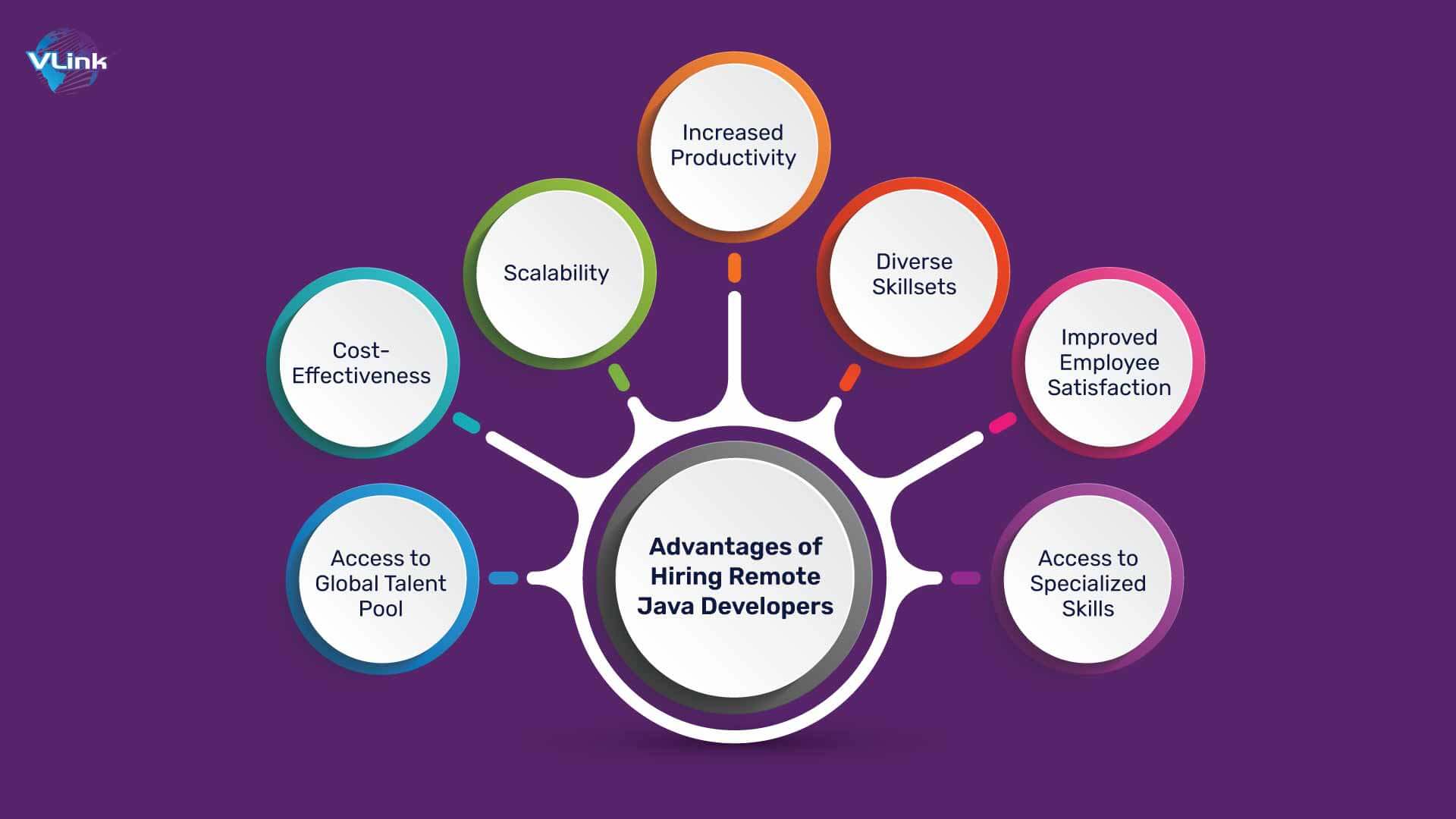
- Access to Global Talent Pool: Remote hiring allows you to cast a wider net and attract top Java developers regardless of location. You can use more than the talent available in your immediate vicinity.
- Cost-Effectiveness: Hiring remote developers is often more cost-effective than hiring in-house teams. You eliminate office space overhead and, depending on their location, can find developers with lower salary expectations.
- Scalability: Remote teams offer greater flexibility in team size. You can quickly scale your development team up or down based on project requirements without the need for long-term commitments.
- Increased Productivity: Studies by Stanford University and others have shown that remote workers can experience significant productivity gains. Factors like flexible work schedules, reduced commute times, and a quieter work environment can all contribute to increased focus and output. Additionally, remote developers often have a strong sense of ownership over their work, leading to higher dedication and commitment.
- Diverse Skillsets: A wider talent pool often translates to a more diverse range of skills and experiences to leverage for your project. This can be particularly beneficial for projects requiring niche expertise that might be scarce in your local area.
- Improved Employee Satisfaction: Remote work arrangements often lead to higher employee satisfaction due to the increased work-life balance and autonomy it provides.
- Access to Specialized Skills: For niche Java development needs, hiring remotely allows you to target developers with specific skill sets you might not find locally.
Disadvantages of Hiring Remote Java Developers
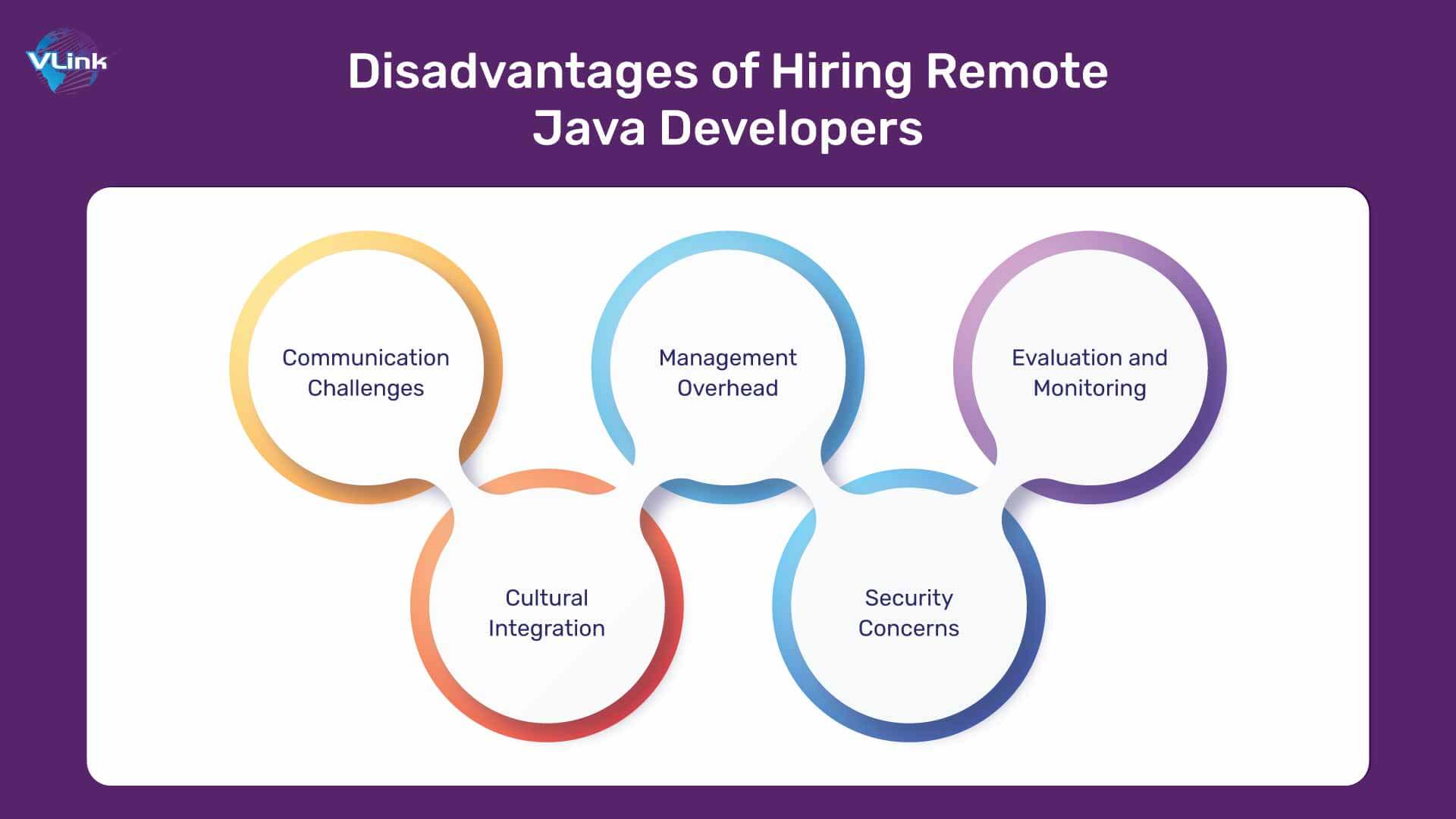
- Communication Challenges: Effective communication is crucial for successful development. Time zone differences, cultural barriers, and the need for face-to-face interaction can create communication hurdles.
- Cultural Integration: Integrating remote developers into your company culture can be challenging, especially for fostering team spirit and collaboration.
- Management Overhead: Managing remote teams requires a different approach. You'll need strong communication skills, clear project expectations, and effective collaboration tools to ensure smooth workflows.
- Security Concerns: Data security is crucial when working with remote developers. You'll need robust security protocols and access controls.
- Evaluation and Monitoring: Evaluating and monitoring the performance of remote developers requires a more structured approach than in-house teams.
What is an In-House Developer?
In-house Java developers bring a specific set of strengths to the table. First and foremost, they're deeply immersed in your company culture. They understand the nuances of your product, the specific challenges your team faces, and the overall vision driving your development efforts. This shared context fosters a sense of ownership and accountability, leading to developers who are deeply invested in the success of your projects.
Secondly, in-house developers benefit from the power of face-to-face interaction. Collaboration becomes seamless. A quick question to a colleague down the hall can spark a breakthrough idea. Brainstorming sessions crackle with energy, and complex technical problems can be tackled head-on in a collaborative environment. This constant exchange of knowledge and ideas can significantly accelerate the development process.
However, building an ideal development team has its challenges. Recruiting and retaining top Java talent can be a competitive endeavor. Fostering a positive and collaborative work environment is crucial to keeping your developers engaged and productive. Ultimately, the decision between in-house and remote developers depends on your company's needs and priorities.
Advantages of Hiring In-House Java Developers
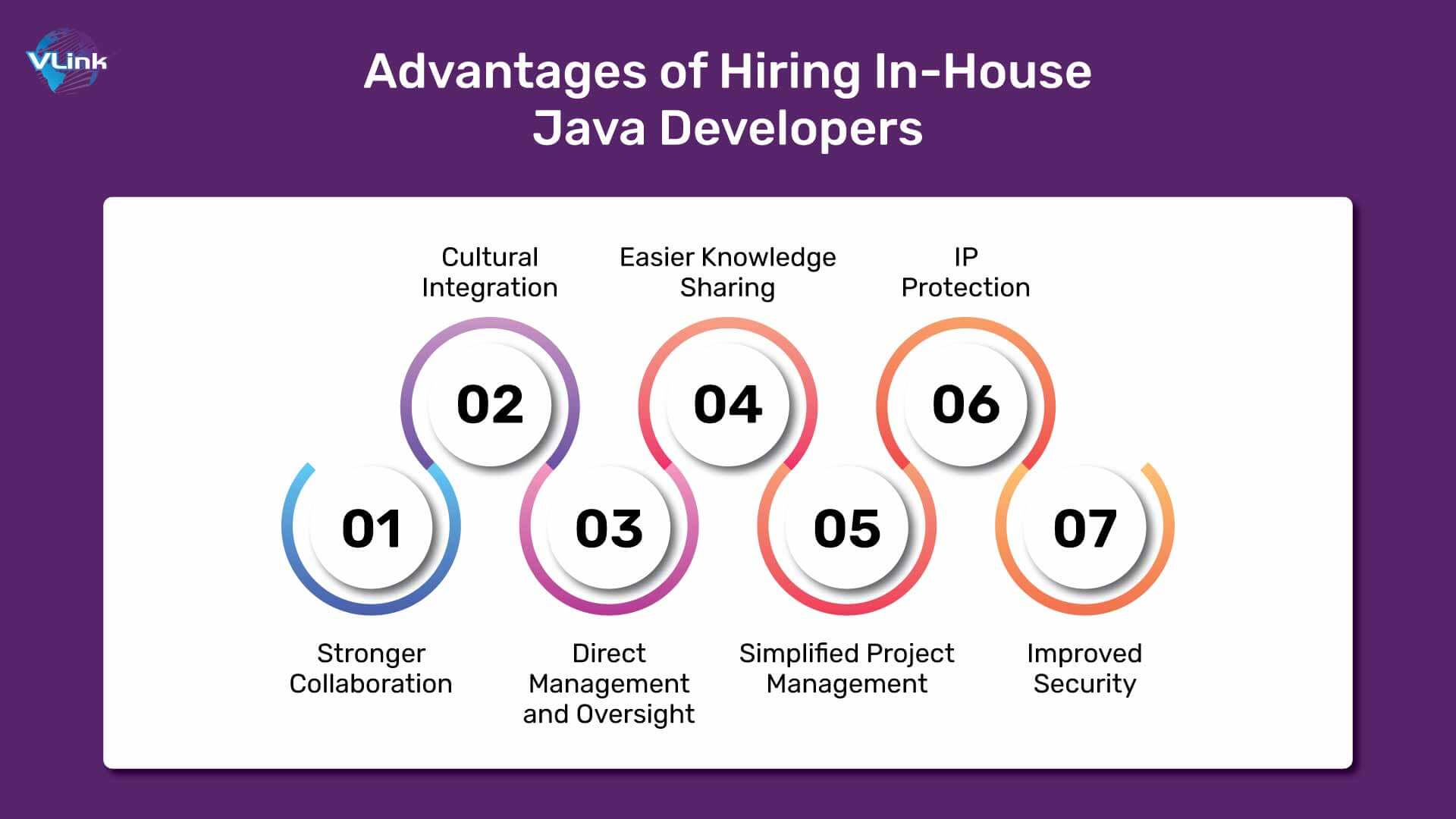
- Stronger Collaboration: In-house teams foster closer collaboration and communication due to physical proximity and regular interaction.
- Cultural Integration: In-house developers are more easily integrated into your company culture, fostering a stronger sense of team spirit and belonging.
- Direct Management and Oversight: You have greater control and oversight over in-house developers' work schedules and daily activities.
- Easier Knowledge Sharing: Knowledge sharing and collaboration are more streamlined within a physical office environment.
- Simplified Project Management: Project management can be more streamlined with in-house teams due to more accessible communication and coordination. Regular face-to-face meetings, impromptu discussions, and quicker issue resolution contribute to a smoother development process.
- IP Protection: In-house developers are typically subject to stricter intellectual property (IP) protection measures, which can be crucial for safeguarding your proprietary code and business ideas.
- Improved Security: In-house developers typically have more restricted access to company data, potentially reducing security risks.
Disadvantages of In-House Java Developers
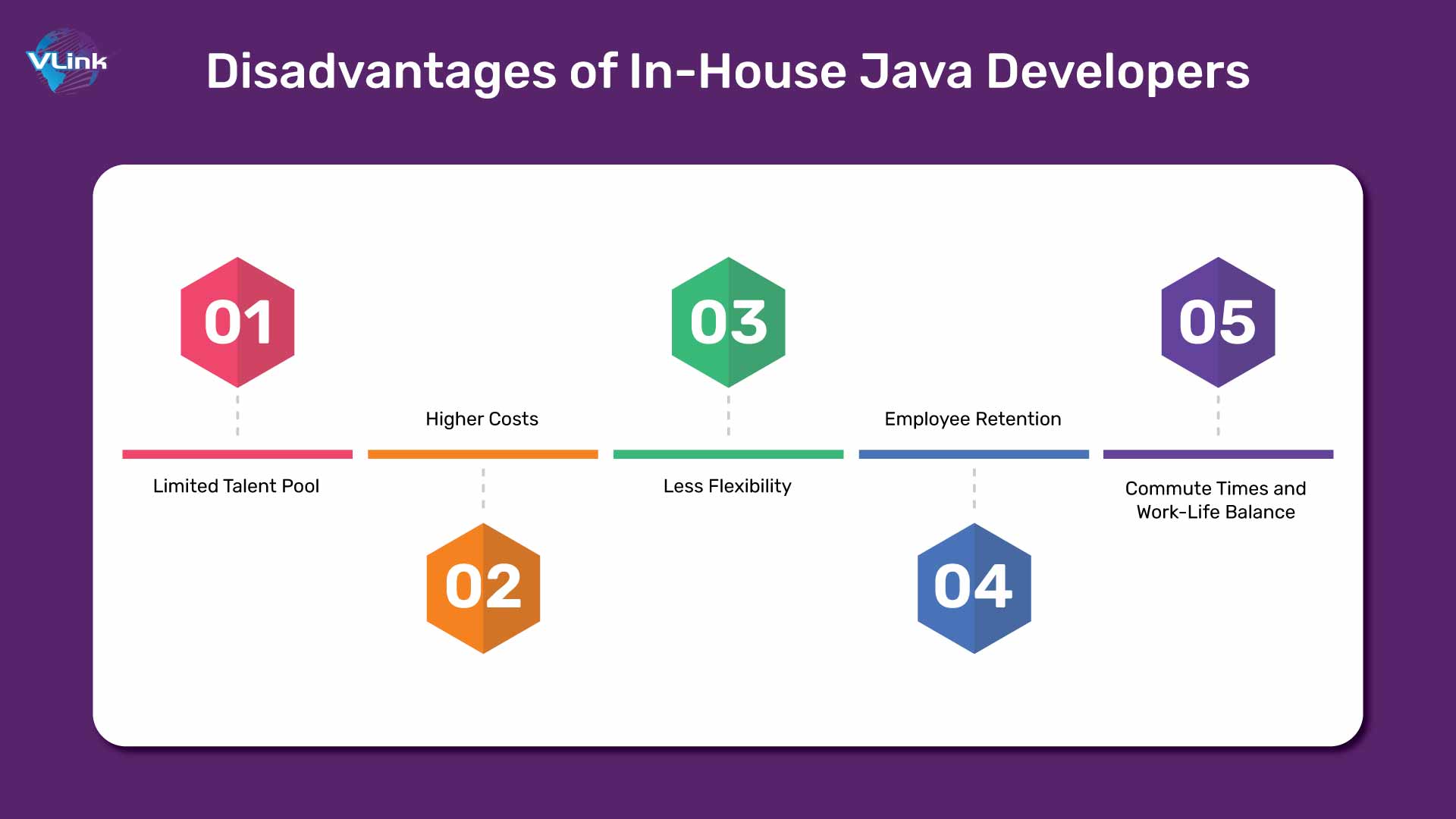
- Limited Talent Pool: You're restricted to the talent available in your location, potentially limiting your options to find the best fit for your project.
- Higher Costs: In-house developers typically require higher salaries and benefits compared to some remote developers, along with additional overhead costs associated with office space and equipment.
- Less Flexibility: Scaling an in-house team up or down can be more challenging and time-consuming than a remote team. Hiring and onboarding new developers takes time, and reducing team size often involves layoffs or severance packages.
- Employee Retention: Competition for top Java developers is fierce. Retaining in-house talent can be more challenging due to limited opportunities for growth within a single company compared to the diverse project opportunities available to remote developers.
- Commute Times and Work-Life Balance: Long commutes can negatively impact employee morale and productivity. Remote work arrangements can help attract and retain talent who value flexibility and a better work-life balance.
Now, let's explore the key factors that will help you make an informed decision that aligns with your project requirements, company culture, and overall goals.
Choosing the Right Hiring Model: Remote vs. In-House
The world of software development has become increasingly flexible, offering companies the option to build their teams with either remote or in-house Java developers. However, selecting the right model for your project requires careful consideration. Here are the key factors to weigh in on your decision:
Team Structure and Communication Needs:
Remote Model:
- It thrives with strong communication tools and established processes.
- Works well for well-defined projects with clear documentation.
In-House Model:
- Enables spontaneous brainstorming and quick problem-solving through face-to-face interaction.
- Ideal for projects requiring real-time collaboration and rapid iteration.
Project Requirements and Complexity:
Remote Model:
- May need help with highly complex projects demanding constant back-and-forth communication.
In-House Model:
- Benefits from proximity for intricate projects requiring frequent in-person discussions.
Company Culture and Management Style:
Remote Model:
- Requires a culture of trust and autonomy for remote developers to flourish.
- Management style should be comfortable with asynchronous communication.
In-House Model:
- Suits companies that value a collaborative environment and direct oversight.
- Traditional management styles with a focus on in-person interaction work well.
Talent Availability and Location Preferences:
Remote Model:
- Opens the door to a global pool of skilled Java developers.
- Ideal for companies needing help finding the right talent in their local area.
In-House Model:
- Limited to the talent pool within your geographical location.
Cost Comparison: Remote vs. In-House Java Developers
The financial implications of each development model differ significantly. Remote development offers potential cost savings in terms of salaries. Developers in countries with lower living costs typically command lower salaries than their counterparts in high-cost-of-living regions. For example, the average annual salary for a mid-level Java developer in the United States can range from $80,000 to $120,000 (USD). In contrast, the average salary in India can range from $40,000 to $60,000 (USD). However, depending on their location, companies need to factor in additional considerations like stipends for equipment or internet connectivity for remote developers.
For example, a company in a high-cost-of-living area like San Francisco might find significant savings by hiring remote Java developers in a region with lower living costs, like Eastern Europe or Southeast Asia.
While cost is a significant factor, direct and indirect expenses should be considered when comparing remote and in-house development models.
Salary and Benefits:
Remote Model:
- Salaries for remote developers may vary depending on location and experience.
- There might be some savings compared to in-house due to lower living costs in certain regions.
However, companies may need to factor in additional benefits like stipends for equipment or internet connectivity.
In-House Model:
- Typically, it involves higher salaries due to factors like living costs in your area.
- Additional benefits like health insurance and paid time off add to the overall cost.
Infrastructure and Equipment:
Remote Model:
- Limited infrastructure costs as the developer provides their own workspace and equipment.
In-House Model:
- Requires investment in office space, furniture, and computer hardware.
- There are also ongoing maintenance and utilities costs.
Management Overhead:
Remote Model:
- Additional investment in project management tools and communication platforms may be required to ensure smooth collaboration.
- Managing a remote team can also demand more structured processes.
In-House Model:
- Management overhead might be lower due to the ease of direct communication and oversight.
Additional Considerations:
- Tax implications: Tax laws and regulations can vary depending on the location of your remote developers. Consulting a tax advisor is recommended to ensure compliance.
- Exchange rates: Fluctuations in currency exchange rates can impact on the overall cost of hiring remote developers.
Remember: The cost advantage can shift depending on your specific circumstances. For instance, a company in a high-cost-of-living area might find significant savings by hiring remote developers in a region with lower living expenses.
Key Considerations: A Comparison Table
Beyond just cost, several crucial factors differentiate the remote and in-house development models. Understanding these key factors empowers you to make the optimal choice for your project:
| Factors | Remote Java Developers | In-House Java Developers |
Team Structure & Communication | Works well with defined processes & strong communication tools | Enables spontaneous collaboration and quick problem-solving |
Project Requirements | Suitable for well-defined projects | Ideal for intricate projects requiring frequent in-person discussions |
Company Culture & Management | Requires trust, autonomy, and asynchronous communication | Suits collaborative environments with traditional management styles |
Talent Availability | Access to a global talent pool | Limited to local talent pool |
Salary & Benefits | Potentially lower salaries, may require additional remote work benefits | Higher salaries with additional benefits |
Infrastructure & Equipment | No infrastructure cost | Requires investment in office space, equipment, and maintenance |
Management Overhead | May require investment in project management and communication tools | Lower overhead due to direct communication and oversight |
So, you've got a groundbreaking Java project in the pipeline, and now comes the critical decision: how to assemble your dream development team? By carefully considering the factors outlined in The Key Considerations When Recruiting Java Developers and thoughtfully analyzing the table above, you can embark on a strategic hiring journey that lands you the perfect talent, remote or in-house.
Final Showdown - Remote vs. In-House
The battle between remote and in-house development models is nuanced, with no single victory. The optimal choice depends on your project requirements, company culture, and budget. Here's a quick comparison to help you decide:
- For Flexibility and Global Talent: Remote teams offer greater flexibility in work schedules and access to a global talent pool. This is ideal for well-defined projects with strong communication protocols.
- For Direct Control and Collaboration: In-house teams provide closer supervision, foster a strong team culture, and enable easier communication. This is well-suited for intricate projects requiring frequent in-person discussions.
- For Cost-Effectiveness: The cost advantage can shift depending on location and experience. Remote teams might offer potential savings in some scenarios.
There's no one-size-fits-all answer when choosing between remote and in-house Java developers. The best approach depends on several factors specific to your project and the company's needs. Here's a breakdown to help you decide:
- Project Scope and Timeline: Remote developers can offer a quicker turnaround for short-term projects with well-defined requirements. However, in-house developers might be better for complex, long-term projects requiring close collaboration.
- Budget: If budget is a major concern, remote teams can be more cost-effective—however, factor in the potential need for additional management overhead and collaboration tools.
- Company Culture: Consider your existing company culture and how well it adapts to remote work. Open and transparent communication is crucial for success with remote developers. Evaluate whether your company has the infrastructure and processes to support a remote development team.
- Skillset Requirements: For specialized skillsets that might be scarce in your location, remote hiring opens doors to a wider talent pool.
- Security Needs: If your project involves highly sensitive data, in-house developers prefer stricter security controls. However, remote development can still be viable with robust security protocols and access controls.
Bonus Tip:
Consider conducting a pilot project with a small remote team before fully committing to a remote or hybrid model. This lets you assess the challenges and opportunities firsthand before making a larger-scale decision. You can also explore co-working spaces as a potential solution for some team members who crave a more collaborative environment outside of a traditional office setting.
Additional Insights:
- Security Considerations: A robust cybersecurity strategy is crucial for projects involving sensitive data, regardless of the development model. Implement strong password policies, data encryption practices, and regular security awareness training for all team members.
- Emerging Technologies: Stay informed about technologies that can enhance your development process. Cloud-based development platforms, DevOps practices, and continuous integration/continuous delivery (CI/CD) pipelines can streamline workflows and improve efficiency in both remote and in-house settings.
- Invest in Your Team: Regardless of the development model, invest in the professional development of your Java developers. Encourage participation in online courses, conferences, and workshops to stay up-to-date with the latest advancements in Java and related technologies.
- Remember, the decision between remote and in-house Java developers is not black and white. You can choose the approach that best aligns with your goals by carefully considering your project needs, company culture, and budget limitations. The future of Java development lies in a hybrid model that leverages the strengths of remote and in-house development, fostering a highly skilled and productive team.
Now that you've comprehensively understood the pros and cons of remote vs. in-house Java development, you're well-equipped to make an informed decision and build your dream Java development team. So, don't wait to find and hire the best Java Developers for your project now!
Hire Remote Java Developers from VLink
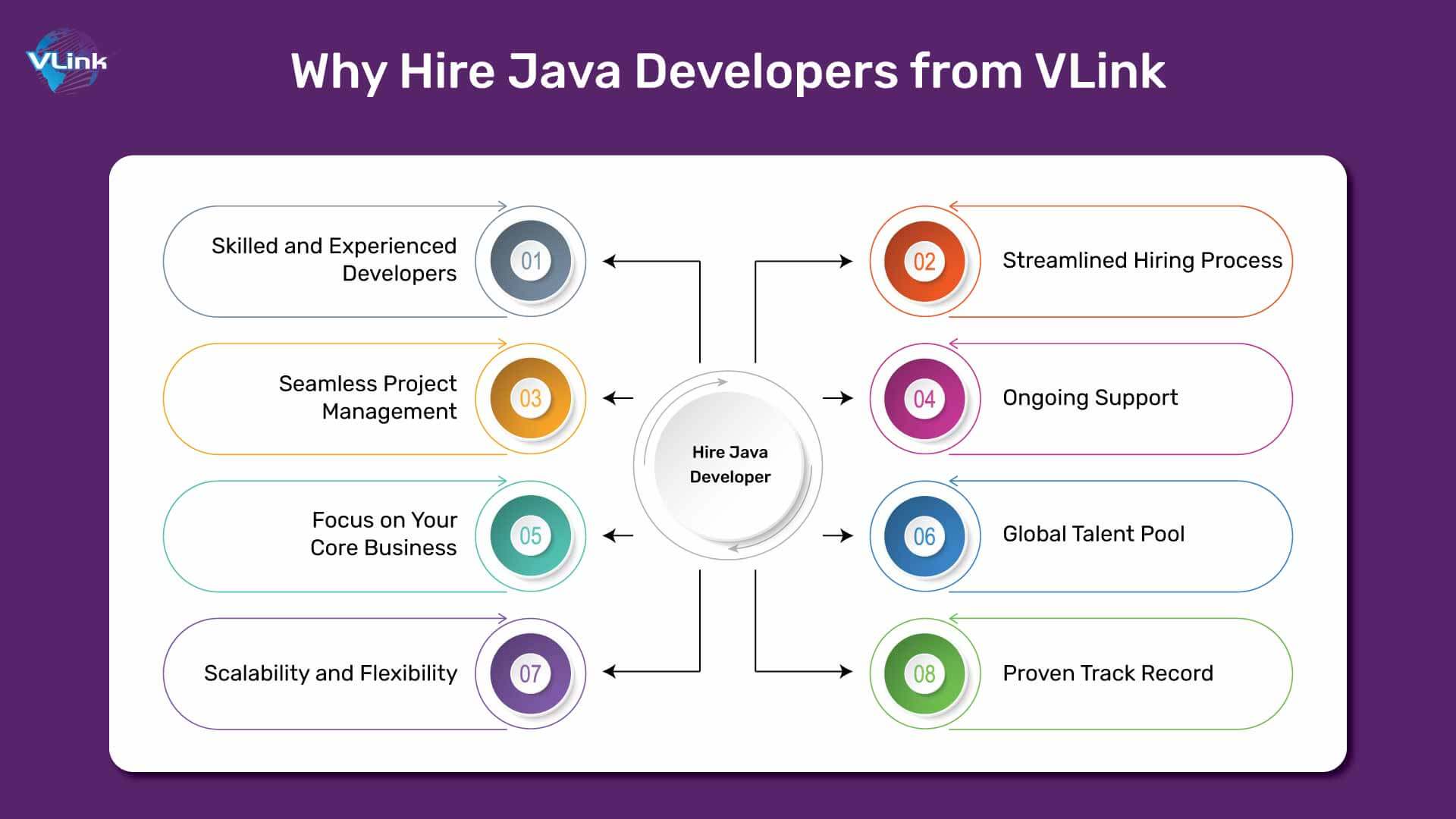
VLink can be your one-stop solution for finding top-notch Java developers. We offer a robust network of vetted and experienced remote Java developers with diverse skill sets. Here's why VLink should be your top choice:
- Skilled and Experienced Developers: We have a rigorous screening process to ensure our developers possess the technical expertise and experience to tackle your project effectively.
- Streamlined Hiring Process: Our dedicated team handles recruitment, saving you valuable time and resources. We take the time to understand your project requirements and match you with developers with the ideal skillset and experience.
- Seamless Project Management: VLink provides expertise to ensure smooth collaboration and successful project delivery. We utilize proven methodologies and communication tools to keep you informed and involved throughout development.
- Ongoing Support: We offer ongoing support throughout development, ensuring you have the necessary resources to achieve your goals. Our team is available to address any questions or concerns you may have.
- Focus on Your Core Business: By outsourcing your Java development needs to VLink, you free up your internal resources to focus on your core business functions. This lets your team concentrate on strategic initiatives that drive growth and innovation.
- Global Talent Pool: Our network extends beyond geographical boundaries. We leverage a global talent pool to ensure you have access to the most qualified Java developers, regardless of their location. This broadens your options and allows you to find developers with the exact skillset you require for your project.
- Scalability and Flexibility: VLink's talent pool allows you to scale your development team up or down seamlessly based on project requirements. This flexibility is precious for businesses with fluctuating workloads or short-term projects. You can easily adjust your team size without the complexities associated with hiring and layoffs for in-house teams.
- Proven Track Record: VLink has a proven successful project delivery track record. We have a strong portfolio of satisfied clients who have benefited from our expertise in sourcing and managing remote Java development teams. You can be confident that VLink has the experience and resources to deliver your project on time and within budget.
So, take advantage of the competitive edge skilled Java developers can bring to your projects. Partner with VLink today and harness the power of our streamlined hiring process, expert talent pool, and future-proof development solutions.
Wrapping Up!
Choosing the right development approach is crucial for the success of your Java project. By carefully considering the above factors, you can determine whether remote or in-house developers best fit your needs. VLink can be your trusted partner in finding the perfect Java developers to bring your project to life.
Discuss your project requirements and explore how VLink can help you achieve your development goals. We offer a comprehensive solution that streamlines the hiring process, connects you with top Java talent (remote or in-house), and ensures your development team possesses the necessary skills to tackle your project with expertise. Don't wait! Contact VLink today and take your Java development initiatives to the next level. Thanks!
Frequently Asked Questions
The answer depends on your project needs and company culture. In-house teams offer stronger camaraderie and real-time collaboration, while remote teams provide access to a wider talent pool and potentially lower costs. Consider a hybrid approach for the best of both worlds.
Technical skills in Java and relevant frameworks are essential. However, soft skills like communication, collaboration, and a passion for learning are equally important. Look for a cultural fit with your team and company values.
Utilize clear communication channels, regular video calls, and virtual team-building activities. Encourage knowledge sharing through code reviews and internal talks. Transparency and open communication are key to building trust and community.
Offer opportunities for conferences, workshops, and online courses. Create a mentorship program where senior developers can guide juniors. Provide regular performance reviews and encourage open communication about career goals and development opportunities.
Prioritize work-life balance, offer flexible work arrangements, and encourage breaks. Celebrate milestones, acknowledge achievements, and implement recognition programs. Feeling valued and having a clear path for growth keeps developers engaged and motivated.








